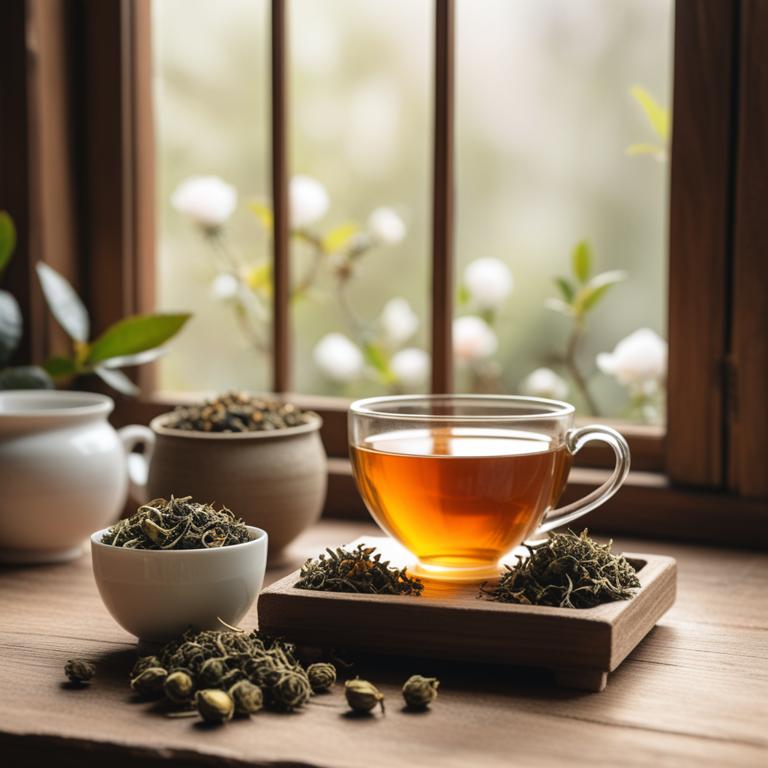11 Best Herbal Teas For Earache

Herbal teas for earache are a natural and holistic approach to treating ear infections and associated pain, typically defined as teas made from various herbs, flowers, and plants that are steeped in hot water to create a soothing and potentially medicinal brew.
These herbal teas offer numerous benefits in treating earaches, including reducing inflammation, combating bacterial and fungal infections, and providing relief from pain and discomfort.
Some popular examples of herbal teas for earache treatment include ginger tea, which has anti-inflammatory properties and can help alleviate pain, chamomile tea, which has antiseptic and anti-inflammatory properties to combat infection, and eucalyptus tea, which can help ease congestion and promote drainage.
Additionally, other effective herbal teas for earache treatment include peppermint tea, which can help relax the muscles and reduce tension, thyme tea, which has antibacterial properties to combat infection, and licorice root tea, which can help soothe and calm the ear canal.
According to the study, teas for earache may be beneficial due to green tea's antinociceptive effects, which are attributed to its antioxidant and anti-inflammatory properties, particularly the phytochemical component EGCG.
Below there's a list of the 11 best herbal teas for earache.
- 1. Eucalyptus globulus teas
- 2. Zingiber officinale teas
- 3. Cinchona officinalis teas
- 4. Echinacea purpurea teas
- 5. Glycyrrhiza glabra teas
- 6. Mentha x piperita teas
- 7. Silybum marianum teas
- 8. Panax ginseng teas
- 9. Cymbopogon citratus teas
- 10. Camellia sinensis teas
- 11. Lavandula angustifolia teas
Also you may be interested in...
TODAY'S FREE BOUNDLE
Herb Drying Checklist + Herbal Tea Shopping List + Medicinal Herbs Flashcards
Enter you best email address below to receive this bundle (3 product valued $19.95) for FREE + exclusive access to The Aphotecary Letter.
$19.95 -> $0.00
1. Eucalyptus globulus teas

Eucalyptus globulus teas have been traditionally used to treat earache ailments due to their anti-inflammatory and analgesic properties, which help to reduce pain and swelling in the affected area.
The herbal preparation's ability to act as a natural decongestant also helps to alleviate ear congestion and promote drainage, thereby treating the earache ailment.
The bioactive constituents of Eucalyptus globulus teas, including eucalyptol, a compound known for its antimicrobial and anti-inflammatory properties, play a crucial role in treating earache by reducing infection and inflammation.
By using Eucalyptus globulus teas, individuals can benefit from a natural and non-invasive treatment option that not only alleviates earache symptoms but also promotes overall ear health.
2. Zingiber officinale teas

Zingiber officinale teas, derived from the ginger plant, have been traditionally used to treat earaches due to their analgesic, anti-inflammatory, and antibacterial properties.
The bioactive constituents, including gingerols and shogaols, help to reduce pain and inflammation in the ear, while also preventing the growth of bacteria that can cause infections.
By reducing inflammation and killing bacteria, Zingiber officinale teas help to alleviate earache symptoms, providing quick and effective relief.
The benefits of using this herbal preparation to treat earaches include its natural and non-addictive properties, making it a safer alternative to conventional pain medications.
3. Cinchona officinalis teas

Cinchona officinalis teas, a traditional herbal remedy, have been used to treat earaches due to their analgesic and anti-inflammatory properties.
This preparation helps to treat earaches by reducing pain and inflammation in the affected area, providing quick relief from the discomfort.
The bioactive constituents of Cinchona officinalis, including quinine and alkaloids, help to block pain pathways and reduce inflammation, making it an effective treatment for earaches.
The benefits of using Cinchona officinalis teas to treat earaches include a non-invasive and natural approach to pain relief, making it a popular choice for those seeking alternative remedies.
4. Echinacea purpurea teas

Echinacea purpurea teas have been traditionally used to treat earaches due to their anti-inflammatory and antimicrobial properties, which help to reduce pain and combat infections.
The bioactive constituents of this herbal preparation, such as alkylamides, caffeic acid, and polyphenols, work together to alleviate earache symptoms by reducing inflammation and fighting off harmful bacteria and viruses.
By drinking Echinacea purpurea teas, individuals can benefit from its ability to soothe and calm the ear, providing relief from earache pain and discomfort.
The benefits of using Echinacea purpurea teas to treat earaches include its natural and non-invasive approach, making it a popular choice for those seeking alternative remedies.
5. Glycyrrhiza glabra teas

Glycyrrhiza glabra teas, also known as licorice root tea, have been traditionally used to treat earache, a painful condition caused by inflammation of the middle ear.
The anti-inflammatory and analgesic properties of this herbal preparation help to reduce pain and inflammation in the ear, providing relief from the discomfort associated with earache.
The bioactive constituents of Glycyrrhiza glabra, including glycyrrhizin and flavonoids, have been shown to exhibit antimicrobial and anti-inflammatory activities, which contribute to its therapeutic effects in treating earache.
The benefits of using Glycyrrhiza glabra teas to treat earache include its natural and non-addictive properties, making it a popular alternative remedy for this common ailment.
Related Study
According to "Mini reviews in medicinal chemistry", Glycyrrhiza glabra teas may be beneficial for earache due to its anti-inflammatory activity and potential to inhibit virus growth.
6. Mentha x piperita teas

Mentha x piperita teas, also known as peppermint tea, have been traditionally used to treat earache due to their analgesic and anti-inflammatory properties.
The bioactive constituents present in this herbal preparation, including menthone, menthol, and limonene, help to reduce pain and inflammation in the affected area.
By acting as a local anesthetic and anti-inflammatory agent, peppermint tea helps to alleviate the discomfort and pain associated with earache.
The benefits of using Mentha x piperita teas to treat earache include natural pain relief, reduced inflammation, and a soothing effect on the affected area.
Related Study
According to the Journal of ethnopharmacology, Mentha x piperita teas possess an anti-inflammatory effect against acute inflammation, specifically against xylene-induced ear oedema in mice.
7. Silybum marianum teas

Silybum marianum teas, also known as milk thistle teas, have been used in traditional medicine to treat earache ailments due to their anti-inflammatory and analgesic properties.
The bioactive constituents present in this herbal preparation, including silymarin and flavonoids, help to reduce pain and inflammation in the ear, thereby providing relief from earache.
Silybum marianum teas are thought to work by reducing oxidative stress and promoting healing in the ear, ultimately alleviating symptoms of earache.
The benefits of using Silybum marianum teas to treat earache include reduced pain and inflammation, as well as a potential decrease in the risk of long-term damage to the ear.
8. Panax ginseng teas

Panax ginseng teas have been used to treat earache ailments due to their anti-inflammatory and analgesic properties, which help to reduce pain and swelling in the affected area.
The bioactive constituents of Panax ginseng, such as ginsenosides and saponins, have been found to have antioxidant and anti-inflammatory effects, which contribute to its therapeutic potential in treating earache.
By reducing inflammation and relieving pain, Panax ginseng teas may help to alleviate the discomfort associated with earaches, making it a promising herbal remedy for this common ailment.
The benefits of using Panax ginseng teas to treat earaches include reduced pain and inflammation, improved overall health, and a natural alternative to conventional medications.
9. Cymbopogon citratus teas

Cymbopogon citratus teas, also known as lemongrass tea, have been traditionally used to treat earache ailments due to their anti-inflammatory and analgesic properties.
The bioactive constituents, including citral and geraniol, present in this herbal preparation help to reduce pain and inflammation in the ear, thus providing relief from earache.
These bioactive compounds have been shown to exhibit antimicrobial properties, which can help to combat infections that may be contributing to the earache.
The benefits of using Cymbopogon citratus teas to treat earache include reduced pain and inflammation, improved ear health, and a natural alternative to conventional medications.
Related Study
According to "International journal of clinical pharmacology and therapeutics", Cymbopogon citratus teas, part of the Otovowen fixed combination, may be a suitable alternative for the treatment of uncomplicated acute otitis media in children, potentially reducing the use of antibiotics without disadvantage to the clinical outcome.
10. Camellia sinensis teas

Camellia sinensis teas, commonly known as green tea, have been traditionally used to treat earache due to their anti-inflammatory and analgesic properties.
The herbal preparation contains bioactive constituents such as catechins, which help to reduce inflammation and alleviate pain by inhibiting the production of pro-inflammatory enzymes.
The anti-inflammatory properties of Camellia sinensis teas help to soothe the ear and reduce discomfort associated with earache, while the analgesic properties help to numb the pain and promote relaxation.
By using Camellia sinensis teas to treat earache, individuals can benefit from the natural and non-invasive approach to managing this ailment, which is free from harsh chemicals and side effects.
Related Study
According to this study, Camellia sinensis teas for earache were reported to be used by 45.5% of the outpatients.
11. Lavandula angustifolia teas

Lavandula angustifolia teas, also known as lavender tea, have been traditionally used to treat earache due to their analgesic, anti-inflammatory, and antimicrobial properties.
The bioactive constituents, including linalool and linalyl acetate, in this herbal preparation help to reduce pain and inflammation, while also combating bacterial infections that may contribute to earache.
By consuming Lavandula angustifolia teas, individuals can experience relief from earache symptoms, such as pain and discomfort, and potentially reduce the risk of complications.
The benefits of using Lavandula angustifolia teas to treat earache include natural pain relief, reduced risk of antibiotic resistance, and a non-invasive approach to managing earache symptoms.